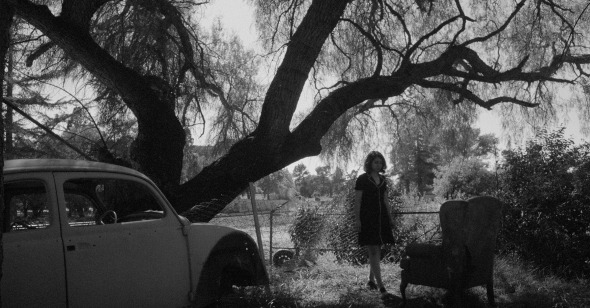What the World Needs Now
By Matthew Eng
Fremont
Dir. Babak Jalali, U.S., Music Box Films
At the heart of Babak Jalali’s wistful comedy Fremont is a sleepless woman. Donya (Anaita Wali Zada), an Afghan refugee, has resettled in the Bay Area city of the title after working as a translator for U.S. armed forces in her native Kabul. Thousands of miles from her family and fearful that the Taliban might target them for reprisal, Donya spends her days working as a wrapper inside the calm, colorless confines of a fortune cookie factory in San Francisco’s Chinatown. When the company’s elderly fortune writer drops dead while on the clock, Donya is given the position and, with it, a new calling.
Fremont is the fourth feature by Jalali, a London-raised, Rome-based Iranian writer, director, and editor. It is also a great case for never judging a Sundance selection by its twee-sounding plot summary. (The film debuted at this year’s festival in the always worthwhile NEXT section.) There is an impressive mystique contained in the boxy frames of Fremont’s crisp, casually elegant black-and-white images, shot digitally by Laura Valladao in 1.33:1 aspect ratio. Zada, a first-time actor who fled Afghanistan in 2021 with her sister after working for several years as a TV presenter and journalist, is often the lone subject of these images. Her composed, stoic face entrances just as it conceals a dull ache for something Donya struggles to name. The film’s supporting characters, like Donya’s dating app-dependent friend and coworker Joanna (Hilda Schmelling), are quick to call it love or maybe companionship, a suggestion that Jalali and cowriter Carolina Cavalli take seriously without casting it as the sole cause of Donya’s malaise. The character holds memories too traumatic to recall and worries too dispiriting to ponder. It is no wonder that Donya seems to reside primarily in her head, even when participating in the world outside it, traveling from one nondescript place to another.
Donya’s world, though sparse and small in its contours, is vividly populated with a handful of memorable characters, including a loquacious, accommodating boss (Eddie Tang), his coolly vindictive wife and business partner (Jennifer McKay), and the perceptive, soap-obsessed proprietor (Fazil Seddiqui) of the under-patronized restaurant where Donya eats her dinners. Her apartment complex is home to other Afghan refugees in the country on special immigration visas following the calamitous military withdrawal of 2021, including a resident chauvinist (Timur Nusratty), who spurns Donya for her cooperation with “the enemy,” and a confidant named Salim, played by another first-time actor, Siddique Ahmed, a rock musician who is so naturally and sincerely compassionate that one wishes the film had found more room for his wry warmth. At the film’s outset, Donya has been waiting eight months for an appointment with a psychiatrist to help her combat insomnia, and it is Salim who gives Donya his slot with a therapist (played by the comedian Gregg Turkington in non-Neil Hamburger mode), who wavers between being a sympathetic ear and a buffoon during his sessions with Donya.
Jalali’s deadpan parameters can be a bit restrictive, stifling certain actors from creating and conveying distinct personalities beneath their impassive facades. While there are some tin-eared readings that zap interactions of their momentum, and several recurring scenes, like those with Turkington, play increasingly like a gimmick, Jalali’s directorial eye vivifies and steadies Fremont, grounding it in a mundane world of mousetraps, busted coffee machines, depleted tubes of moisturizer, unflattering hairnets, and household critters. An air of the ephemeral pervades all the film’s people, places, and things, but there is also something intangible and uncanny, like the dislocation of inhabiting an unfamiliar place on one’s own, unsure of when, if ever, it might feel like home.
Donya is quick to diminish her condition, to avoid looking her survivor’s guilt in the face. Refreshingly, Jalali and Cavalli refrain from spelling out all the horrors Donya has witnessed; they allow mournfulness to suffuse the film in other indirect ways, like the discordant gusts of a rusty baritone horn as it shares space with a sitar on Mahmood Schricker’s jazz-inflected score. In one scene, Joanna trills an airy rendition of the influential British folk singer Vashti Bunyan’s classic “Diamond Day” on a karaoke machine; when the song ends, Donya is seen quietly weeping. What raw nerve has this tune touched inside the character? Where has it taken her? We don’t need answers; it is enough to know that she is moved.
“As long as your heart bears the burden of suffering,” Salim assures Donya, “falling in love is your right.” Donya’s battle to reconcile remorse with everyday desires reaches its pinnacle in Fremont’s final chapter, when Donya ends up on a road trip to the southern California city of Bakersfield. En route, she encounters a benevolent mechanic, played by The Bear’s Jeremy Allen White, whose gauche, guileless sweetness brings out lighter shades in Zada’s performance. The appearance of the internet’s heartthrob du jour steals some crucial focus from Fremont’s star but never fully upsets Jalali’s carefully calibrated and largely maintained balance of rue and whimsy. The film’s final freeze-frame is wondrous, a call to seize life’s detours and linger in them for as much time as one is allotted. Fremont ends not with a cure for Donya’s restlessness but a recognition that peace of mind can be attained even in a foreign, landlocked place, far from the ones she loves and longs to see. Sometimes it is enough to take a breath and feel one’s feet on the ground, finding serenity in the lulls of far-flung tumult as well as the will to continue.
Fremont was the Opening Night selection of Museum of the Moving Image's 2023 First Look festival.
